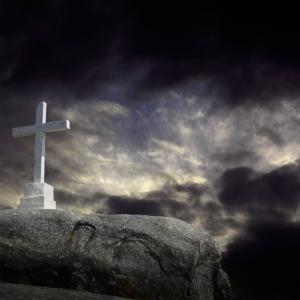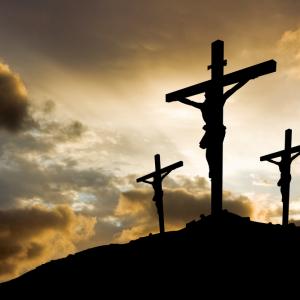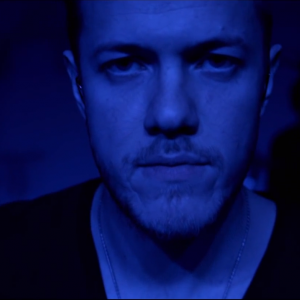

When Raleigh Mennonite Church decided to fast from food waste for Lent, they didn’t know that 14 days in, the World Health Organization (WHO) would declare COVID-19 a pandemic. At a time when a core group of members planned on salvaging still-edible food from the dumpsters outside of grocery stores, hoards of Americans emptied the supermarket shelves of essentials like milk and bread and boxed wine.

Few people in my life would likely make the mistake of characterizing me as a naturally disciplined or pious person. Zealous, maybe. Pious, no. I’ve tended to live life in a passionate pursuit of a particular direction only to stumble, fall, get back up, and run a different way (not necessarily opposite, just different).
Thus, it has been an interesting experience for me this Lent to spend time reading, writing, and reflecting on discipline and ascetic practices. This stumbling and turning has often felt like an aimless back and forth, but in these weeks of reflection, it has been encouraging to look back and see growth. While the back and forth has been real, what has seemed like “just meanderings” have turned out to have some forward direction.
Father Richard Rohr gives this encouragement, “The steps to maturity are, by their very nature, immature.”
As we look back, each step behind us is going to seem immature, maybe even like a mistake. Hitting our head and saying “God, I was such an idiot back then,” is evidence of grace at work in our lives. The ability to see the ways we failed that were invisible to us at the time, is a sign of our growth in wisdom and discernment. This is often hard for me to accept.

CEO of World Vision Australia Rev. Tim Costello reminds us that the Lord's Prayer "is not about us."
"This Easter we remember that Christianity is in some ways about the power of weakness — a man on a cross ... exposing the weakness of violent power. This rather is extraordinary power defined in love," he says.

Sufjan Stevens’ newest album, Carrie & Lowell (out now), is a heartbreaking meditation on personal grief. It’s also joyful, baffling, and delicately mundane.
In the spirit of a listening party, a few of us sat down to play through the album, sharing liner notes and meditations on the songs that grabbed each of us. Conclusion: it's really, really good. Stream Carrie & Lowell here, and listen along with us below.
“Death With Dignity” — Tripp Hudgins, ethnomusicologist, Sojourners contributor, blogger at Anglobaptist
Tripp: I love the first song of an album. I think of it as the introduction to a possible new friend. “Where The Streets Have No Name” on U2’s Joshua Tree or “Signs of Life” on Pink Floyd’s Momentary Lapse of Reason, that first track can be the thesis statement to a sonic essay.
So, when I get a new album — even in this day of digital albums or collections of singles — a first track can make or break an album for me. I sat down and listened attentively to “Death With Dignity.” It does not disappoint. With it Stevens introduces the subject of the album — his grief around troubled relationship with his mother and her death — as well as the sonic palate he will use throughout the album.
Simple guitar work, layered voicing, and a little synth, the album is musically sparse. The tempo reminds me of movies from the nineteen sixties or seventies where the action takes place over a long road trip.
Catherine Woodiwiss: I was thinking road trip, too. There’s real motion musically, which, given a claustrophobic theme and circular lyrics, is a thankful point of release. It’s a generous act, or maybe an avoidant one — he could have made us sit tight and watch, and he doesn’t quite do it.
Julie Polter: This isn’t a road movie, but the reference to that era of films just made me think of Cat Stevens’ soundtrack for Harold and Maude, especially “Trouble.” (This album is one-by-one bringing back to me other gentle songs of death and duress and all the songs I listen to when I want to cry).

All Holy Week, I've been listening to Hozier's “Take Me to Church” — an odd sort of spiritual exercise, I suppose.
At first it was the hauntingly catchy refrain: “Take Me to Church” — and after all I would be going to church all week this week, the holiest of weeks in the Christian calendar. Maundy, or Holy, Thursday, Good Friday, Easter Vigil, Easter Sunday.
The refrain was jarring against the artist's desired impact of the song, that in fact no one would be taken to church, that no one would trust the institutional church that has proven so dogmatic, divisive, violent, and decidedly un-Christlike in its practice as to become "a fresh poison each week."
“Take Me to Church” is about sexuality, about dogma, about prayer, about worship, about heaven, hell, life, death, sacrifice, sin, confession, and absolution. It’s about Catholicism and Protestantism and Jesus and atheism and fear and hope and love.
We each see pieces of it. Many American viewers saw Hozier's music video and wrongly assumed he was gay — that the sum of his message was about the church's persecution of homosexuality. And even though Hozier is not gay, he did mean to indict the church for its horrible treatment of the LGBTQ community — but the message of his song goes beyond sexuality.
Hozier is an Irish singer, a man who grew up with the deadly legacy of Catholic-Protestant war, a man whose national church was beset by sexual abuse scandals and pews full of dogmatic believers who had never read the Bible. Masses in many cases were dominated by ritual and women and babies sent away to church-run facilities, like the one where the bodies of nearly 800 infants were recently found in an unmarked mass grave.
Americans can look on the Irish church with judgment, yet our own church scandals and hypocrisy can fill even more pages.
As a pastor looking toward Easter Sunday 2015, I see something else in these lyrics. I see and hear a deep longing. Not only for sex. But a longing for the God who came to earth in Jesus, who died and rose again because of love.
I asked colleagues and friends about their responses to this song, as it dominates airwaves during Holy Week, and no one seemed to want to broach the topic. Too sexual, some said. Another, that "it could not be redeemed." Another, that "people would be too offended."

Have we made God into a monster? And as a result, have we taken the holiest of weeks in the Christian year and dressed it up as a celebration of bloody, violent sacrifice?
If so, I'm afraid we've gotten Easter all wrong.
I lead a small group discussion every Sunday morning at First Christian Church, Portland, where my wife, Amy, is the senior pastor. It's one of my favorite hours of the week, partly because of the common bonds of trust we're building that transcend our many differences. But it's also become a very safe place to ask hard, disturbing questions and to express ideas that, in many other contexts, might be shouted down or even excluded entirely from the conversation.
This week, we were discussing whether one could identify as Christian, in that they follow the example and teaching of Jesus, while also claiming no belief in any sort of metaphysical divinity (i.e., God). One member of the group, Heath, raised something very thought-provoking, particularly given the context of Holy Week and what it means to so many.
“If we are to believe that God sent Jesus to die for our sins,” said Heath, “it's easy to understand why so many would want to distance themselves from such a monstrous God.”
That led to a lively discussion about what Easter — and more specifically, Good Friday (when Jesus died by crucifixion) — meant to each of us, and how that understanding informed our understanding of the nature of God.
If God sent his only son first and foremost to die for our sins, then the climax of the Gospel narrative at Easter is the defining point at which we are left with what Heath called “Fifty Shades of God.”
Here we are left with what I call the conundrum of substitutionary atonement, which is the belief that Jesus took our place on the cross — deserved by us, not him — in order to satisfy the price someone had to pay for our sins. And although many who call themselves Christians claim this belief, it raises some hard questions we tend to overlook when embracing such a claim.

Systemic theology lecturer Dr. Ben Myers talks about Jesus' prayer, "deliver us," and how following his example leads us not to optimism nor pessimism but into hope.
"The prayer of Jesus teaches us quite a different way of looking at the world. He acknowledges the presence of evil in our lives. He acknowledges that there are things in this world that are bent out of shape ... that no amount of human effort could make right. ...When we join our voice with the voice of Jesus we catch a glimpse of the world as it really is — vulnerable, hurt, yet poised on the brink of redemption."

In this reflection, Rev. Dr. John Dickson talks about total dependency on the bread of life, and being one of the first cultures in history that doesn't see the process of food being grown, harvested, and prepared.
"For most of us food is like magic, it just appears — but the Lord's prayer says, No, no, everything comes from the hand of God."

If you listen, each bucket has its own special sound. First are the empty buckets and their muted ting of dripping sap falling straight to the galvanized steel bottom. Next is the dop that reverberates from the slightly sweet drop running off the spile to a thin layer of liquid below. But it is the soft, and all too rare and timeless plop that I wait for. That quiet plop (or sometimes plip) signals that over half of that the three-gallon bucket is full and the tap is giving in abundance.
There is a slight quickening of the heart when the bucket is heavy enough to need two hands to pull off the hook. Then an involuntary smile to hear the pitch of the shwoosh ascend as the smaller bucket presents it’s offering to the larger. But sometimes, before I touch the bucket at all, I stop and wait to hear what it has to say. Ting? Dop? Plip? Plop?
I look at the tree and then its neighbors. I strain to hear the rhythm of the buckets around me and wonder, what makes one tap run so well when others are nearly dry?

In 1 Corinthians 1:18-31 Paul says that “the message about the cross is foolishness to those who are perishing, but to us who are being saved it is the power of God.”
I can think of many times when I’ve felt foolish. Like forgetting someone’s name, or worse, calling them by the wrong name. Or when I read The Life of Pi and thought it was based on a true story because of the voice of the journalist.
The times when being foolish has really hurt, though, were when I placed trust in people only to be let down.

Among Christians who practice Lent, the Holy Week timeline is a time for reflection on the practices of Jesus in his last days prior to his death. Reflecting on Holy Week can be a spiritual practice to consider the place of those practices in our own lives. According to the Gospel of Mark, Jesus followed his triumphal entry into Jerusalem on Palm Sunday by taking time on Monday during that week to publically drive out and speak against temple-based financial exploitation.
The cleansing of the Temple is documented in all four gospels. Three place it during Holy Week. Scholars have written that this event occurred in the area of the Temple known as “Solomon’s Porch,” which was open to Jewish and Gentile worshippers alike. It was a marketplace for the purchase of items needed for worship — pilgrims attending Passover celebration, unfamiliar with Jerusalem, may have purchased sacrificial animals at a higher price than elsewhere in the city. Poorer individuals, unable to afford a lamb, may have purchased overpriced sacrificial doves. Foreign currency, forbidden inside the Temple, could be exchanged, for a fee, for local currency to pay the annual Temple tax.
It has been argued that the High Priest may have received a percentage of the profit from the money changers and merchants, so their removal from the Temple would have caused a financial loss to those in power. It has been argued that the noisy marketplace atmosphere may have been disruptive to the atmosphere of worship. The text is unclear about the exact nature of the sin. However, it is clear that when Jesus saw the market, he became angry and turned over tables, driving out those exploiting the people and publicly calling them “robbers.”
Whatever the exact nature of the financial sin was that was occurring in the Temple at the time, the text in Mark suggests that after this act of clearing the Temple, those in power began to earnestly plot Jesus’ arrest and death. Jesus’ opposition to the money changers was directly related to his arrest and crucifixion later in the same week.
While I would like to identify with Jesus in this story, I realize I am more often in the position of the watching crowd. Or am I the merchant, lining my own pockets with the misfortune of others and making profits or receiving benefits from practices that exploit?

It is Holy Week. And I must admit I’m challenged by it. I’m the kind of person who is much more comfortable in my mind, in words on pages, and in thoughts strung together. I am much more comfortable there than in my body, in my own feet stepping down the street, in my own hips, thighs, calves, swaying arms cutting air, swinging, bobbing, Reebok-ing anywhere.
This wasn’t always the case.
There was a stint in high school, and again in college, and again in grad school, and again in the other grad school when I believed in my body’s capacity to excel — and so it did. I sailed around that high school track multiple times without stopping! I dove for the ball in the students v. teachers volley ball tournament, and I danced: jazz, tap, ballet! In college I rode my bike everywhere. In grad school I did interval training and in the other grad school I did power-walking — and Jenny Craig.
Mind you, all of these periods came in short bursts that propelled me forward for a time and then I would slow down, go into myself, and come out again with another burst in a year or two.
But my last big burst was about eight years ago. I haven’t swayed anything or bobbed anywhere for any significant amount of time since.
I felt it coming on. I knew it was happening when it was happening, but I had no idea I would become consumed by it.
“I just don’t feel like getting up to go walking,” I’d tell myself at my normal walking time.
“What if today is the day I get jumped and raped in the park?”
So I stayed home, convinced I was safer in my bed. Then I moved to a city I didn’t know and the rationalizations took deeper root.
And so, for eight years I have lived like a dualistic gnostic — pushing myself toward spiritual renewal while allowing my body to grow stagnant, stiff, and bloated.
What triggered it? I’ve asked myself that question many times over the years.
A recent event in my life crystalized it for me: Loss had stifled me. A loss locked my feet and knees and would not let me move forward. This loss was loss of hope.
Most of us have that area of our lives where we struggle to hope. For me it is that space down deep where I hide the dream of a family: a loving husband and laughing children and a rockin’ writing and speaking schedule — yeah! It’s my dream.

In a world surging with anti-Semitism, Islamophobia, and the persecution of Christians, a Muslim is soon to portray Jesus in a film called Killing Jesus. Based on Bill O’Reilly and Martin Dugard’s bestselling book of the same name, the film seeks to capture the human dynamics and political milieu around the controversial death of Jesus of Nazareth.
Haaz Sleiman, a Lebanese-born American Muslim, was chosen to play the lead as the Jesus character. His selection makes him virtually the first actor of Middle Eastern descent to ever play the role in any mainstream film.
While National Geographic’s attempt at authenticity should be celebrated, the casting of Sleiman has, instead, stirred quite the controversy.
Imagine — in a context where religious tribalism is growing fiercer, a Muslim is embodying the role of a Palestinian Jew and central figure to Christianity. Is this a heretical impossibility or is this a picture of something beautiful?
On Tuesday, I sat down with Haaz to explore the uniqueness of this moment in his career and how the experience of embodying the life and teachings of Jesus has left him forever changed.
What immediately stood out is the grace with which he is handling the criticism from Jews, Christians, and Muslims alike. Rather than worrying about the controversy, Sleiman feels lucky to have had the opportunity. For him, it was the “ultimate experience as an actor” as he had been “heavily shaped” by Jesus during his childhood. Growing up in a Muslim home, he was taught to revere Jesus as the prophet equal to Mohammed who had come to reveal the beauty and potential of humanity. To play this role gave him a “once-in-a-lifetime opportunity” to “become the character that he truly believes in.”

My friend sent this link to me the other day, as it’s something we’re considering doing ourselves. The idea is simple, though would take some effort and a little courage to do well.
You get artists, singers, musicians willing to go out into the streets and share their music with anyone they meet, in a spirit of engagement, community, and purveyors of joyfully selfless and unexpected moments.
You go where the people are (sound familiar?).
You have a purpose (not to recruit people into your church; that’s selfish and not something I remember Jesus focusing on as much as being a healer and servant).
You give everyone you encounter an opportunity both to participate and to engage the cause.
This (below) is a pop-up church in a train station in the U.K. Personally I could have done without the giant crosses in the middle — but if nothing else, it helped share attention with the people involved, which should be part of the point. They’re inviting people into a sort of flash-mob singalong of “Lean on Me,” a spot-on choice for Good Friday in my universe. Then people are given a chance to drop a few coins, some food, or whatever they have to give into a donation space for a local book bank.
In this Lent reflection, Grant and Uncle Graham Paulson talk about cultural genocide and forgiveness in the same breath. It is an honor to listen to someone who is possible of such a witness.

Lent is a season of preparation. But the process of preparing for Easter does not need to be all negative commitments and focused on the things we don’t do.
One opportunity for developing new positive practices during Lent involves learning to see. The Gospels recount at least three different instances after the resurrection in which followers of Jesus were not able to recognize or “see” him: Mary at the tomb mistaking Jesus for the gardener, the road to Emmaus, and the delayed reaction when Jesus gave great fishing advice.
The truth of Easter is not always readily apparent. It requires the ability to see clearly. This means rubbing our eyes, clearing them of gunk, and focusing our vision.
Having recently shifted from spending most of my day in an office to spending almost all of it outside, I’ve been ruminating on what it might mean to practice seeing the non-human or natural world more clearly. Here are my initial reflections:
Have you ever been moved by a sunset? A star-filled canopy of the night sky? A canyon-filled horizon? A towering wooded cathedral?
What was the feeling? Gratitude for the beauty? Humility in the midst of grandeur? Inspired to greatness while experiencing greatness? Joy in celebration of it all?

At the heart of the Lenten season is an interesting paradox.
Lent is not observed in the making of Lenten commitments, but you can’t actually observe Lent without making a commitment.
Elsewhere at Sojourners, Jarrod McKenna reminds us that Lent is not ultimately about “giving up stuff” but about “the preparation of our hearts for what God has done in Christ.” Adam Ericksen encourages us that, “The worst thing we can do during Lent is to be tempted to earn God’s favor through self-denial.”
To both these points and posts I say, amen.
But as a lifelong Protestant who recently returned from spending time with Benedictine monks and nuns in New Mexico, I’ve come back with some evolving perspectives on fasting and other ascetic practices from the Catholic tradition. This isn’t in contradiction to either of these authors’ perspectives but more of a summation of my recent convictions as someone who has tended to skip the Lenten fasts altogether.
Here is what has struck me. I do not believe most Western Christians today are so focused on giving up their creature comforts for Lent that they are in danger of making their faith dependent upon physical fasting. Maybe I’m generalizing too much. So I’ll make this statement more personal:
My greatest struggle has not been that I have been so committed to “giving up stuff” for Lent that I have forgotten that God’s grace is unconditional. Rather, I have tended to avoid the discomfort of giving up my daily habits and physical dependencies by using a vague sense of “inner attitudes” of preparation as an excuse. As a result, I believe I’ve been missing some real opportunities to be receptive to God’s grace.
There are few reasons I believe this to be so important.

Making a whip of cords, he drove all of them out of the temple, both the sheep and the cattle. He also poured out the coins of the money-changers and overturned their tables.He told those who were selling the doves, ‘Take these things out of here! Stop making my Father’s house a market-place!’ - John 2:15,16
This is one of the most important stories in the life of Jesus. So important, that it’s one of a handful of stories that all four Gospel writers actually all share.
Even though they remember it differently.
Matthew, Mark, and Luke — they recall that this episode where Jesus entered the Temple grounds and stirred stuff up once and for all — they remember it near the end of his life. They place it as one of the main reasons that Jesus is arrested and put to death as a capitol offense against the Roman Empire.
Walking into the Temple — run by the Jewish religious elite who had been put in place by the Roman imperial oppressors — was tantamount into walking into a federal government building and blowing it up.
Except Jesus doesn’t do that. Jesus is a pacifist. Jesus is a prophet.

As well as being a good surfer and a great mate, I believe Hillsong’s pastor Chrishan Jeyaratnam is one of the finest preachers in Australia. His teaching on “Your Will Be Done” in the Lord’s Prayer: Lent series is exceptional.

We’ve all heard the sidewalk preachers and TV Evangelists quoting the Gospels, telling us, "Repent, for the Kingdom of God is at hand!"
It’s a claim that is generally intended to strike fear and trembling in the hearts of many. We’re supposed to straighten up, do right, and atone for all of our heinous, sinful ways.
If you went to my kind of church growing up, there wasn’t a sermon that went by that you didn’t hear the pastor say something like, "The end could be today, tomorrow or next week. So you’d better beg for forgiveness, get right with the Lord, or risk getting ‘left behind.’"
The season of Lent is a time of reflection and repentance, yes. But we’ve come to misunderstand both what it means to repent, and what Jesus is talking about when he foretells of God’s coming Kingdom.
As for the latter, Jesus preached to some degree about the afterlife, yes. But his Kingdom-talk primarily was focused on us, on receiving and co-creating God’s Kingdom vision for ALL of us, here and now, in our very midst. So rather than talking about some hellfire apocalyptic end-times, he’s urging us to open our eyes, to see what’s right in front of us.
We can have what he, what God, long for us. To live in a world inspired and living into the Kingdom possibilities just there, nearly within our reach if we’ll only claim it and risk everything to fulfill it.

The Christian journey of Lent is upon us. Lent commemorates Jesus’ journey into the wilderness. After his baptism, where Jesus heard the voice of God say to him, “This is my Son, the Beloved, with whom I am well pleased,” Jesus was led by the Spirit into the wilderness. After 40 days of fasting, he was tempted by the devil.
In good mimetic fashion, Jesus had received his true identity from God at his baptism. As radically relational creatures, mimetic theory claims that we receive our identity in relationship with others. If you were to ask me to identify myself, I would respond by referring to my relationships — I am a husband, a father, a son, a friend. Even when we identify ourselves by what we “do for a living,” relationships are implied. An accountant, for example, helps people allocate their financial resources. Our very identity as humans, and everything we do, is dependent upon our relationships with others.
I hope that mimetic theory’s emphasis on human relationality seems obvious, but it actually runs against the modern grain. René Descartes gave the impetus for the modern world with his statement “I think, therefore I am.” But that statement is false. You don’t exist because you think for yourself. You exist because you are related to others.
Jesus received his identity as the Son of God from his relationship with his heavenly Father, but in the wilderness he was tempted to doubt that relationship. The story tells us that “The tempter came and said to him, ‘If you are the Son of God, command these stones to become loaves of bread.’”
If. It’s such a small word, but don’t be fooled by its size. If is loaded with significance. The devil tempted Jesus three times. Each time the devil used the word “if.” And each time the devil tried to seduce Jesus into doubting his identity as God’s Son.
Australian Catholic Archbishop Mark Coleridge shares a powerful reflection on the Lord’s Prayer:

It snuck up this year, as though I’d almost forgotten about it until I saw friends in another time zone posting Mardi Gras pictures. Mardi Gras is this week? I thought. That means Lent begins this week?! Maybe it’s because I don’t go to church right now, or because I’m not in a spiritual community like I was before I moved cities. But for whatever reason, it came fast and unexpected, and something inside won’t let me pass it up. As much as I disagree with some of the traditional teachings about Easter and various interpretations of why Jesus was crucified, I have always had a penchant for Lent.
Lent is a time that draws out the heart’s ability to draw nigh to your Creator. Of drawing closer to God, to others, to the wide open world around us. A time for spiritual reflection and inner examination. A time to pause. A time for simplicity. A 40-day season containing strong, beautiful symbolism. Death from life. Life from death. The two are inseparable. Hope is reborn, recycled out of crushed pain and heartache. The timing of this season enhances the meaning all the more to me, as we begin Lent in the waning winter, in which it is still snowing as I write this. But we end Lent well into spring.

I love today’s Lenten reflection by the Rev. Dr. Jacqueline Grey on the first verse of the Lord’s Prayer.
Some of my favorite quotes:
“Praying this each day calls us to orientate our intention away from ourselves and remember that we are not the centre of the universe. Instead it reminds us of our rightful place, alongside all our brothers and sister in adoration of our great God.”
“This prayer is a call to action. It makes a demand of us. How are we as God’s people going to make God’s name holy? This is a call to action to make known the beauty of God. The justice and perfection of God. And the majesty of God’s name in a world that wants to ignore it.”
“It’s a call for our lives to mirror the same beauty and holiness of God. To truly live up to our vocation as image bearers of our glorious God.”
“We are part of the family. So let’s do the family business of bringing light to the world.”
Watch Dr. Jaqueline Grey speak on the Lord's Prayer below.

Lately, a particular quote has been wending its way around Facebook, popping up in the feeds of the most disparate names on my friends list. It appears written in feminine cursive script or blocky varsity letters or etched under a photo of leaping flames: “May the bridges I burn light the way.”
The words seem significant on Ash Wednesday, the first day of Lent, when ministers mark a believer’s forehead with a sign of the cross — two simple finger strokes drawn as a reminder of the impermanence of this world and our own mortality. The imposition of ashes is often accompanied by words from Genesis 3:19: Remember that you are dust, and to dust you shall return.
Lent is the season of reflection, reevaluation, reconciliation, and — here’s a hundred dollar Christian word — repentance. For many, the word “repent” calls to mind a red-faced TV preacher banging a hammy fist on the podium, or a guy in a sandwich board, standing on a corner yelling through a bullhorn about the fires of hell and the threat of damnation. YOU MUST REPENT!
But repent means, in the most literal sense, to turn in a different direction. It is less about avoiding being struck down by God than embarking on our own particular course-correction.
Lent is not about giving up stuff.
Lent is about the preparation of our hearts for what God has done in Christ.

The violence of our world seems to be spiraling out of control. Every news outlet is filled with the latest tragedy and for many, the violence has struck closer to home than they ever imagined. Sadly, much of the violence is being done in the name of religion. Religion — at its best — is designed to be a conduit for right relationship. At it’s worst, used as a tool for manipulation and violence. While the former is certainly happening, the latter appears to be one step ahead at the moment.
If ever there were a time where the work of peacemaking seemed soft and unrealistic while proposing some kind of fairy tale future reality, it is now. If ever there were a time to set aside the way of reconciliation for the way of revenge, it is now. Peacemaking appears to be a royal waste of time reserved for the ignorant idealists.
Yet, if ever there were a time the exact opposite case could be made, it is now. In recent history, there has never been a time peacemaking is more necessary. In fact, the moment we deny the necessity for peacemaking, we deny the very mission of God and the vocation of God’s people. God’s work is peace — the holistic repair of relationship — and the vocation of God’s people. We aren’t pawns in a divine drama that will end in an atomic holocaust allowing us to apathetically put our hands up in resignation because “everything is going to hell.” No, the Jesus Community is to announce the reality of God’s kingdom and participate in God’s activity of making all things new. And not just in some future world, but NOW.
Where do we start and how do we keep hope in a world of war?
We need to give up peace for Lent.

This year, some have given up Facebook for Lent. Others joined the “National Day of Unplugging” on March 7-8, putting away their phones, tablets, and laptops for a 24-hour digital Sabbath designed to slow people down in an increasingly hectic world.
According to the National Day of Unplugging website, people unplugged in order to dance, sleep, write, play, reflect, relax, reset, tune in, chill out, stay sane, and be more connected.
But wait a second — be more connected? That seems odd, since the promise of social media is that it will strengthen connections. Facebook links us instantly to hundreds of friends, family members, co-workers, and neighbors. Twitter enables us to follow people and collect followers of our own. LinkedIn links us to colleagues through an enormous professional network.
Social media seems to be all about connections. But its links have serious limitations.
For me, joy in the everyday begins with food. If I can take time to make food and drink holy, if I make my table a place of family and community, a place of health and wellness, a place of good choices that sustain creation, I am grounded. Food is the place where I began my journey towards social justice, as a self-righteous young vegetarian who lusted after meat.
Food is the thing we all have in common, and with it, Jesus set forth the Eucharist. Is that enough for you to believe food is important?
Do you ever wonder why Paul spends so much time advising his churches on food and dinner manners? It's because the Eucharist was a wine-and-bread-leavened feast that intentionally leveled the strict hierarchy of Roman society. This enables Paul to confidently state, "There is no longer Jew or Greek, there is no longer slave or free, there is no longer male and female; for all of you are one in Christ Jesus."

Abram left his homeland on a promise and a prayer. God called. Abram went. The Biblical text makes it seem so simple. There are no signs of struggle or doubt. There is no grief over what is left behind, only the forward look toward a new land and a new future. Leaving home for Abram seems so easy.
As I reflect on this week’s scripture, I’m in Lebanon listening to stories of Syrian refugees who left their countryand their kindred to find a place of refuge. Unlike Abram, they did not leave on the promise that they would become a great nation. They left because bombs fell on their houses. They left because food became scarce. They left because they watched their loved ones die in the rubble as buildings fell to the ground.
As we enter into this season of Lent, it is fitting for us to pause and listen to their stories. Remembering Christ’s suffering is more than an exercise in gratitude. It is a chance for us to stand in solidarity with those around the world who suffer each day. It is a challenge for us to take our own suffering (be it large or small) and connect it to the suffering of others and to the suffering of Christ on the cross.

We clearly live in a world that is filled with risks and dangers, and because the increased availability of modern technology allows for harm to occur at unprecedented rates and levels, one can argue that we live in one of the most treacherous eras of human history. However, while the need for protection from harm is both natural and commendable, we are forced to consider whether protection itself can eventually become harmful, unnatural, and even condemnable. In other words, with such extensive resources invested in the pursuit of safety and security, one is forced to consider: What are the consequences of such “protection?" And what happens when so much time and effort is dedicated toward protecting ourselves from our neighbors that we eventually lose sight of who are neighbors actually are? At what point does the heightened priority of protection lead to the increased inevitability of isolation and ignorance? And finally, in our efforts to build impenetrable walls of protection (often in the name of freedom), do we not eventually incarcerate ourselves from the rest of the world and thus limit what it actually means to live free?

For most folks, these names will not mean much: Eric Pizer, Christopher Barber, and Andrew Harris.
They are names that may have a bit resonance in Wisconsin, where I am from. What they represent, though, are the struggles we face as a society dealing with concepts of repentance and redemption. They represent the way those concepts get overrun by politicians seeking to exploit the public’s fears. We as a people, after all, do not seem to be in a very forgiving mood these days.
So the distinctive stories of these three Wisconsin residents might offer a good starting point for Christians thinking about what our faith tradition calls us to during this season of Lent.

“Jesus was led by the Spirit into the wilderness to be tempted by the devil.”
Thus begins the spiritual drama of Lent, the forty days before Easter that commemorates Jesus’ wilderness experience. No human, not even Jesus, can escape the temptation of the devil.
Just before Jesus was led into the wilderness, he was baptized in the Jordan River by John. As the Gospel of Matthew reports, when Jesus emerged from the water “a voice from heaven said, ‘This is my Son, my Beloved, with whom I am well pleased.’”
Jesus’ identity as God’s Son had always been true, but he received confirmation of his relationship with God at his baptism.

Seven years ago this week, I had my “come to Jesus” moment.
That’s not to say that over the past few years I haven’t had many experiences in which I’ve come away wondering “did I ever really believe up until now?” Many of those moments were far more profound and life-changing. It’s just that for me, it’s where a certain chapter of my life began.
I was raised in a Christian tradition that prized altar calls and bowing your heads, closing your eyes, and raising your hands to be saved. There was a clear delineator of when you were “born again” and when you were not. It was a moment in history, not just a spiritual exercise.
I don’t totally disagree. I think that there is something significant about the moment you first say yes, the same way I can remember the first time my best friend and I stopped just being colleagues. Our friendship has had many more important moments, but going to see Alice in Wonderland after work on a rainy Monday evening in March was where it started.
But as I have persisted (persevered for you Calvinists) in this faith I’ve discovered more and more what a relationship with God is like. In order for it to work, as Martin Luther famously said, all of life must be repentance. Every day the choice to say “yes” and not “no, I’m so done with this” is just as significant, if not more because coming to Jesus is often easier than staying.

Even the winter won’t last forever. We’ll see the morning, we’ll feel the sun.
We’ll wake up in April, ready and able, Sowing the seeds in the soil.
Even the darkness cannot disarm us. We’ll see the morning, we’ll feel the sun.
-Audrey Assad
Easter is what many would argue to be the quintessential turning point of the Christian faith. The crux. The climax of the story. The thing that you must be able to articulate into carefully formed sentences depicting your belief, as though words and theology solely define your spirituality and very existence. Perhaps from all of this lies the basis for the trite messages that I, along with so many others, have heard about the Christian faith. “Jesus died for your sins.” “Jesus paid the debt.” “Jesus stood in your place and died for you so that you might have life.”
And if those words bear truth and meaning to you, I have not come to take them away, nor discredit them.
It’s just not the Jesus I’ve come to know, face-to-face in my human spiritual struggle.

Today is Ash Wednesday and the beginning of Lent. I grew up in a small evangelical church that only paid attention to the Christian calendar on Christmas and Easter. But over many years now, I have learned to celebrate the richness of all the Christian seasons from my friends in more liturgical traditions and from marrying a Church of England priest!
Lent offers us the much-needed spiritual preparation for Easter. Ash Wednesday is the place to begin; and that often includes fasting — in different ways and traditions. At Sojourners, we usually have a big staff pancake breakfast on Shrove Tuesday morning, the day before Ash Wednesday. But today, many of us are fasting.
Ash Wednesday doesn’t begin a hunger strike, but rather a season of self-examination, spiritual reflection, repentance, sacrifice, and focused prayer. Lent is a time to examine our hearts and lives, to acknowledge our sins, to look for the ways we are not choosing the gospel or welcoming those whom Jesus calls us to.

This spring, I gave up alcohol for Lent, the forty days of penitence between Ash Wednesday and Easter. And now almost one week after the Alleluias and Easter baskets, I may be addicted to Lent.
On Shrove Tuesday, the day before Lent began, my thirteen-year daughter Maya explained alcohol to her seven-year old sister in the backseat of our car: “See, sometimes adults just like having a drink after a long day of work. It helps them relax.” That same week, one of my friends said, “You aren’t a heavy drinker, but you are a consistent drinker.”
It was time to take a break, even if I knew that one glass of red wine at night wasn’t the end of the world. I needed to give it up because I wasn’t sure if I could.

The first Christians confessed that Jesus is "God from God, light from light, true God from true God." Jesus is, they finally confessed after centuries of dispute, who the Gospels and the apostles plainly tell us: God without qualification. Bethlehem's baby boy grew to be the man from Nazareth, who is also from before time and forever the only begotten Son.
Jesus tells Philip that he and the Father are one; that if Philip has seen Jesus, then Philip has seen the Father. Paul tells the Colossians that Christ is the visible image of the unseen God. The Hebrews are taught by their apostle that Jesus bears the very stamp of God's nature.
If anything we think we knew about God before Jesus arrives in Mary's womb contradicts what we see and hear of Jesus in the Gospels, then we are the ones who are mistaken, the ones who weren't paying close enough attention before he came (yes, Jesus reveals the same relationship-initiating God of holy love we encounter in the pages of the Hebrew Bible); we are the ones who have, since his decades of extravagant humility among us as one of us, forgotten the Christ.

He came to Jesus at night, sneaking off to see the man behind the miracles.
He was a powerful Pharisee, a member of the Sanhedrin, the Jewish ruling council. He wasn’t supposed to mix with the motley lot that followed Jesus.
But Nicodemus had to know: Was the charismatic Galilean for real?

We are offered a significant choice, namely between two ways of being human. The difference between logical necessities or physical necessities and vital necessities is made clear in that in the latter we have the possibility of refusing ‘to turn away from a disaster’ – we can in fact choose a lesser way of being human over a fuller way. What is at stake in the necessity of cry is one’s own humanity, the meaning of one’s own existence, and to turn away from crying is to turn away from decision and responsibility. This is to deny the very possibility of becoming genuinely human.

“Liturgical celebration is a re-entrance of the Church into the event, and this means not merely its ‘idea,’ but its living and concrete reality.”
—Fr. Alexander Schmemann
You and I bring our life experiences with us when we gather with other Christ followers for worship. Everything that has happened to us on our pilgrimage in this world accompanies us, in fact, wherever we go.
Our past is part of what makes us unique persons. What we have endured and felt and accomplished informs our conversations and often helps determines our actions in the present moment. This is what it means to be human.

“Blessed are the peacemakers, for they will be called children of God.
“Blessed are those who are persecuted for righteousness’ sake, for theirs is the kingdom of heaven.
“Blessed are you when people revile you and persecute you and utter all kinds of evil against you falsely on my account. Rejoice and be glad, for your reward is great in heaven, for in the same way they persecuted the prophets who were before you.”
Social Justice Reflection:
Jesus was a peacemaking, blessed child of God, but he also was an “other.” Reviled and persecuted, he was the paperless son of displaced immigrant parents. The prophetic iconoclast. That guy who hung out with those people, the type most modern leaders would not associate with, except for a photo opportunity at a Thanksgiving Day soup kitchen. Let us remember on Sunday when we celebrate his resurrection, that Jesus was crucified because he was an outsider whose way of doing things scared and angered the powers-that-be.
We have become a nation that loves to “other” people. We point out their differences as reasons they cannot be trusted, as evidence that they take too much from the rest of us or threaten our well-being. We have lengthy, bitter debates about allegiance and legitimacy, and we reject those who do not meet our standards. We know who belongs, and the others need to clear out and leave us alone with our worldly possessions, our rules, and our way of doing things.

We're anticipating.
We're jubilant!
“Hosanna in the highest! Blessed is he who comes in the name of the Lord!”
So, we dance and we sing.
But just before this moment in the story there's this surprising passage. The Gospel of Luke reads, "As they were listening to this, he went to tell a parable, because he was near Jerusalem, and because they assumed that the kingdom of God was to appear immediately."
"Immediately." Well, at least they knew their own minds. This is the trouble about knowing our own minds. It's not the same thing as having a thesis with a well constructed argument. And it's not the same thing as being right.

As a seminary graduate and a Masters of Social Work student, I have a passion for social justice and working to improve the wellbeing and health of vulnerable populations. After seminary, during my time as a youth leader, we often turned to Matthew 25:31-46, the familiar passage about “the least of these,” and discussed God’s emphasis on justice and serving the marginalized in our societies.
My time as a social work student, particularly through my current class on international social work, has expanded my concept of the “least of these.” We have learned about some of the most vulnerable populations around the world – child soldiers in Uganda and Colombia, young girls trafficked into the sex trade in Cambodia, HIV/AIDS patients from Haiti, migrants left to die in the desert while trying to cross the Mexican-U.S. border, and the list continues. These concepts were not completely unknown to me and would likely not be new to you either. This past week, however, we studied a different topic, one that has not drawn as much media attention – global mental health.

On Palm Sunday many will hear the Gospel of Luke’s perspective surrounding Jesus’ celebrated entry into Jerusalem (Luke 19:28-40). In hearing this well-known portion of the New Testament, we are often led to wonder how the same crowds that so graciously and enthusiastically welcomed Jesus would passionately and viciously call for his death just a few days later. In trying to comprehend the sudden and significant shift in public opinion, we recognize that the crowds did not swing their support independently, but rather, they were acting under the influential push of propaganda.
As Luke’s Gospel reminds us, in between Jesus’ entry into Jerusalem and the calls for his crucifixion, the “chief priests and the scribes” plotted to put Jesus to death (22:2). As these powerful elites were “afraid of the people”, they conspired in a power-protecting push to have Jesus humiliated, tortured, and brutally killed. And so, while Luke’s Gospel does not provide exact details into the strategies of the chief priests and scribes, their motivations appear to be clear, as they, and others within the ruling class, perceived Jesus as a risk and thus needed to ensure his quick and clear elimination. As a result, due to the influential influx of propaganda, combined with an overly complicit public, just a short time after Jesus was welcomed as a king he was sentenced to death as a criminal.

This past week I had an opportunity to teach an intensive course on the book of Matthew. I enjoy these opportunities, not only to teach, but to look at and present a book from start to finish. Although it is not possible to delve into every detail found within the book, following the plot line from start to finish helps to pick up on themes and recurring events and/or elements that accentuate and highlight certain points throughout the broader story. It is easy to miss such connections when snippets and bits and pieces are read rather than reading the whole story from beginning to end.
One such theme is how unsettling — literally — the person of Jesus was. Throughout Matthew’s gospel we hear how Jesus shook the foundations of society.

What would an “atheist Lent” look like? A group of young nonbelievers are finding out, observing the Christian practice minus its religious context.
They have given up alcohol, animal products, and various Internet and cellphone interactions. One has vowed to make a daily Lenten practice of telling those he encounters how important they are to him.
But their observance of the 40-day period in which many Christians abstain from worldly desires in a bid to come closer to God has upset some atheists who say borrowing religious traditions is antithetical to nontheism.
The exercise has also illustrated a divide in the nontheist community – between older atheists who see religion as inherently evil and younger atheists who are more open to interactions with religious belief.

I am part of a liturgically worshiping tradition. There are days I wish I wasn’t; days when our Kyrie is lacking splendor and our Eleison feels redundant; moments that I wish we could get to the important stuff — my inspired and infallible message (I kid) — and toss the unending Psalm or Prayers of the Church.
And then there are the other times, when I am guiltily reminded that cutting the creed means missing out on the same words spoken by millions of believers before me. Or when the music just all works and my heart is stirred by the Hallelu– (shhh, its Lent) Chorus.
So I like to remind my community of believers from time to time why we do what we do. I have long felt the risk of liturgy is that it becomes rote narration, a thoughtless speechifying of sorts. So that this might be avoided, here are my thoughts on the creeds and why a corporate confession of faith is still valuable today.

“What? What happened?” My co-worker asked, sensing the solemn look on my face.
“Another patient died,” I reported. Grief and thick silence hang in the air as I thought back to the last time I saw this person, hospitalized, unable to speak, but for a brief moment our hands met in an embrace, and although he couldn’t speak, his demeanor and soft touch of the hand said it all.
I brought myself back to the present moment. It was the end of the work day and I strapped on my helmet to bike home, a Lenten commitment I’ve found to be incredibly rejuvenating.
I pedal past the housing projects and turn the corner around the city jail. Activists holding bright colored placards protest peacefully against the death penalty. I smile at them. “Keep up the good work!” I enthuse, giving them a thumbs up from my navy blue mitten and pedal on my way.
A second later, it hits me. Tears rush to my eyes but refuse to come out. The taut muscles in my throat contract; that familiar lump in which no words can come out, just expressions of the heart. Yes, it hit me.The juxtaposition and irony of it all. Life and death. One man died today from four letters that no one should ever have to die from, but globally, some 1.8 million do every year. Another man protested for the life of another to not be cut short before the redemption and healing and forgiveness began.

More than once I’ve been referred to as a modern-day Troubadour. I’ve always liked this designation because it has a romantic, archaic ring to it that sounds just a little bit more flattering than mere singer/songwriter, naturally appealing to my vanity. But it once occurred to me that I wasn’t entirely sure of its meaning and thought I should look it up.
Not surprisingly, I discovered the word to have various historical uses and nuances. But the definition that intrigued me most, and which I recognize as fairly accurate of my own sense of calling and vocation is this:
Troubadour:
a lyric poet sent by one (usually of the King’s court)
with a message of chaste love to another.
Well … there you go. Just two weeks ago (on Valentines Day) I posted a song and message of chaste love in a blog. In it, I celebrated 30 years of marriage to my wife Nanci; a union that has resulted in three beloved (now adult) children, their own unions to beloved others, two grandchildren, and a deeply meaningful, long-term foster relationship with a young woman and her beautiful children who, in fact, are coming over for dinner tonight. I can’t wait.
Although not every chaste union strives to produce offspring, Fr. Gabrielle of St. Magdalen, in his meditative devotional Divine Intimacy, teaches that the highest glory of the chaste union is in it’s potential to become a willing “collaborator with God in the transmission of life.” That is: a relationship that is materially fecund; suggesting a dark, loamy richness capable of concealing and safeguarding a vulnerable seed, and providing a nutrient-rich soil from which it can spring to it’s own leafy uniqueness. It’s a lovely image.
Ironically, what struck me this morning is that Valentines Day is celebrated at the very onset of the season of Lent. And Lent, in contradistinction to Valentines, is essentially a season where the Christian “faithful” penitently consider the devastating disaster that is infidelity — particularly, infidelity to God, and by extension, to all that God is in faithful relationship to.